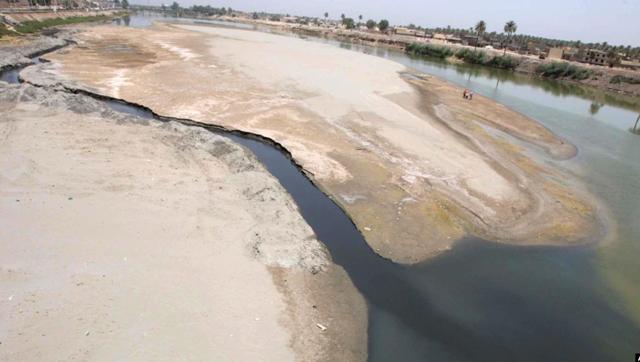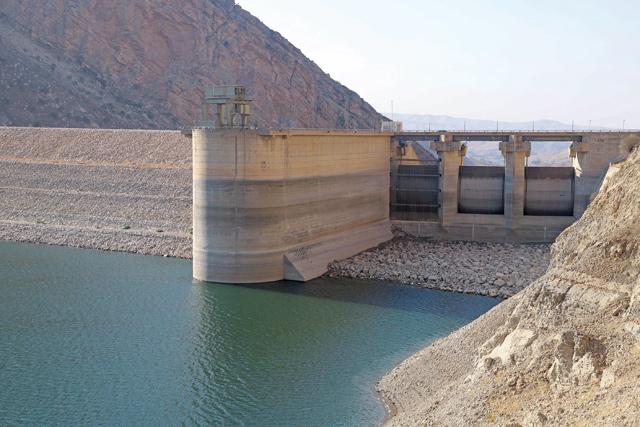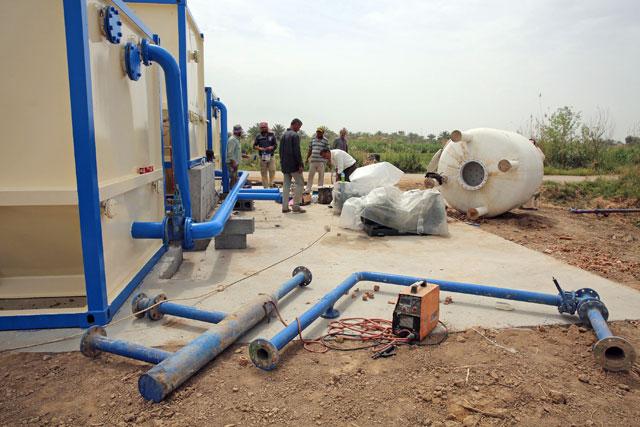You are here
As neighbours build dams, Iraqis watch twin rivers dry up
By AFP - Aug 26,2020 - Last updated at Aug 26,2020

An Iraqi farmer walks in his land in Iraq’s southern port city of al-Faw, 90 kilometres south of Basra near the Shatt Al Arab and the Gulf on August 17 (AFP photo)
DIWANIYAH, Iraq — With its neighbours activating new dams, Iraq’s historic twin rivers could run dry — unless new infrastructure projects and tense talks with Turkey and Iran bear fruit.
Nowhere is the effect on the country more palpable than in Basra, Iraq’s only coastal province.
Here, the Tigris and Euphrates — on which millions of Iraqis rely to farm — meet at the Shatt Al Arab waterway before spilling into the Gulf.
But with flows already heavily weakened, seawater is pushing back into the freshwater rivers, strangling wildlife and human settlements that have survived on these banks for millennia.
“Salinity has gone up in recent years and it’s killing the farmlands,” said Abu Shaker, a 70-year-old who has spent decades growing Iraq’s famed date palms.
Now, with such little fresh water, Abu Shaker and fellow farmers have left their ancient palms withering on cracked and salty earth, moving north in search of potable water.
“Before, we could sell our dates in the Gulf and as far as the United States,” he said.
“Now, you can see with your own eyes. This whole river died.”
Iraq’s water woes aren’t new. But with increasing regional desertification and population growth, Turkey and Iran are keener than ever to keep precious water resources for themselves.
Their new dams on the Tigris and Euphrates, and the tributaries that feed them, have reduced water flows into Iraq by half, said Baghdad’s Water Minister Mehdi Al Hamdani.
But he remains hopeful, with plans in the works to improve access across the country and guarantee drinking water to all, even in a worst-case scenario.
‘Total interruption’
Hamdani, who headed Iraq’s dams directorate before becoming minister, said there were plans to build a large reservoir in Makhoul, north of Baghdad.
“It would allow us to store more water, generate electricity and protect Baghdad in case of floods,” he said.
It would be one of the biggest infrastructure projects in Iraq since 2003, when a US-led force toppled president Saddam Hussein and unleashed years of conflict.
Since then, government plans to rehabilitate dilapidated power grids, water networks and roads have been regularly derailed by warfare, most recently the years-long fight against the Daesh group, which Iraq declared defeated in late 2017.
A health crisis sparked by a shortage of safe drinking water hospitalised some 100,000 people in Basra in 2018.
This year, an unprecedented fiscal crunch caused by low oil prices forced the government to suspend infrastructure investments.
But new dams alone won’t save Iraq’s waterways, experts warn.
Sustainable access, they say, will only be secured through water-sharing deals with Ankara and Tehran.
Talks with Turkey, which have focused on the enormous Ilisu dam on the Tigris, were suspended for two years but resumed in May, when Iraq’s new Cabinet came into power.
Hamdani vowed that an ongoing air and ground assault by Ankara on Kurdish militants in northern Iraq would not derail the “positive” talks, which included a deal to regulate filling the Ilisu.
Iran to the east has also activated dams, causing flows to the Dukan and Darbandikhan reservoirs in Iraqi Kurdistan to drop “from 45 cubic metres per second to 7 cubic metres per second”, according to the ministry.
In some parts, flows are at a meagre “two cubic metres per second — that is to say, an almost total interruption”.
Hamdani was again optimistic, however, saying comprehensive negotiations with Tehran were proceeding smoothly.
Troubled waters ahead
But as a receiving country, Iraq has little leverage, lamented Mohammed Al Chaleyhawi, who leads a farming cooperative in the southern agricultural heartland of Diwaniyah.
“Turkey can launch a water war at any moment, whenever it suits it,” Chaleyhawi told AFP.
The droughts that wrecked Iraq’s harvests between 2016 and 2018 were a taste of what may come, he said, warning that within five years, the Tigris and Euphrates could dry up, killing wildlife and limiting potable water.
“Iraq only has one solution: Using economic pressure against Turkey,” said Chaleyhawi, suggesting Baghdad could restrict the import of Turkish goods and services.
Others have suggested trading crude for water, like under the 1990s United Nations-led programme that allowed an Iraq under crippling sanctions to trade barrels for food and medicine.
But Iraq, OPEC’s second-largest producer, needs to act fast.
Already the world is using less crude, and Iraq’s nearly 40 million people need 71 billion cubic metres of water yearly, according to the UN’s Food and Agriculture Organisation.
By 2035, when Turkey and Iran’s dams are set to be completed, Iraq is set to receive just 51 billion cubic metres.
And the population of the “land between the two rivers” will have swelled to more than 50 million, for whom the life-giving waters could be just a distant memory.
Related Articles
BAGHDAD — Iraq on Saturday asked Ankara to increase the flow of water downstream along the Tigris and Euphrates rivers, as both countries fa
DARBANDIKHAN, Iraq — Iraqi officials warned on Tuesday of a drastic drop in the flow of water in a river from Iran due to low rainfall and d
AL MASAHADA, Iraq — After plentiful winter rains, Iraq is heading into summer with overflowing reservoirs and lush marshes.














